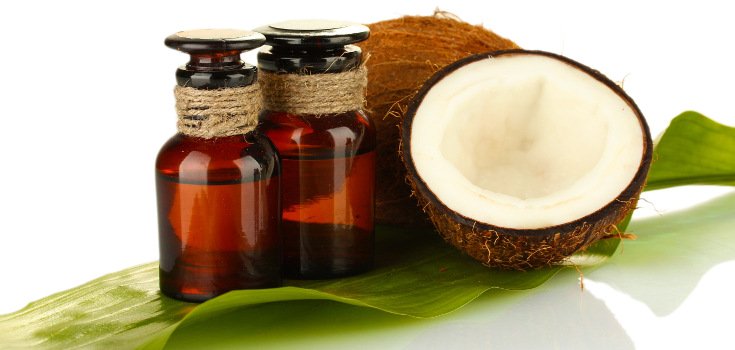How to Use Coconut Oil for Perfect Hair and Skin

In India, hair is traditionally seen as a sign of strength and beauty, which is why many people of the Sikh faith leave at least part of their hair uncut. However, unlike in the West, the hair and scalp are oiled first before washing in India. This simple, inexpensive treatment just involves massaging 1-2 tablespoons of coconut oil (it can be diluted) into the scalp and through the hair, which is then left for an hour or even overnight.
So Why Coconut Oil? Examining the Hair Benefits
There are several other oils recommended by Ayurvedic medicine for hair, with coconut oil being best for people with a Pitta dominance (one of the doshas in Ayurveda). This type of hair tends to be fair or red, oily, silky and prone to early greying and hair loss – traits that seem quite common in the West.
Reducing Protein Loss in Hair
In addition, a study in the Journal of Cosmetic Science has shown that out of coconut, sunflower, and mineral oil, only coconut oil can reduce protein loss in hair as a pre- and post-wash treatment.
The reason for this was that coconut oil is made of lauric acid, which has a high affinity for hair proteins because it is actually able to penetrate the hair shaft. This is due to its straight, linear chain and low molecular weight.
Mineral oil is a hydrocarbon and therefore has no affinity for proteins, while sunflower oil is too bulky because of the double bonds present in this and all other unsaturated fatty acids. If the oil cannot penetrate the hair shaft, then it cannot protect against protein loss.
Reducing Damage to Hair Cuticles
Coconut oil is also more polar than mineral oil, which may be another reason why it can penetrate the hair shaft while mineral oil cannot.
This ability has also been found to reduce damage to the hair cuticle during combing by reducing swelling that would have otherwise damaged the hair, particularly if it is combed while wet. The oil’s lubricating properties further protect hair from damage.
Defeating Head Lice with Coconut Oil
Other research has found that a combination of coconut oil and anise as a spray was more effective than permethrin at curing head lice infestations, with an 82% cure rate in the coconut and anise group as opposed to the 42% in the permethrin group.
Could it Help with Hair Loss?
Additionally, there are many anecdotal reports of coconut oil reversing hair loss and even grey hair, with the latter being plausible due to the oil’s antioxidant properties.
What’s more, the lauric acid in coconut oil may decrease DHT, a more potent form of testosterone that is implicated in hormonal hair loss. Therefore, coconut oil could also benefit hair by being included in the diet.
Delving into the Skin-Healing Properties of Coconut Oil
Skin problems—like acne, dry skin, and wrinkles—happen to nearly everyone at some point, but you don’t need to slather your face with toxic chemicals in order to get positive results. Actually, all you may need is some coconut oil.
Coconut oil can serve many different uses when it comes to natural skin care. While it isn’t right for every skin type, some people can pitch their costly (and potentially damaging) skin creams for this all natural solution.
Cold-pressed organic coconut oil mimics sebum, the skin’s lubrication system. Also, because it’s antimicrobial, antiviral, and antifungal, it helps strengthen your body’s defenses. After all, the skin is the immune system’s first line of defense.
It is these same properties that lead to the countless health benefits of coconut oil, including its ability to rid the mouth of harmful bacteria.
5 Ways Coconut Oil can Benefit the Skin:
- 1. Wound healing – Because coconut oil has these various protective qualities, it is a good choice to use as a wound-healing solution. It can prevent infection and speed the healing process. The results of one study even said that wounds treated with virgin coconut oil (VCO) “healed much faster” compared to non VCO-treated wounds.
- 2. Eczema – Coconut oil can also be an useful for atopic dermatitis, or eczema. This skin disorder produces an itchy red rash and sometimes scaly, dry patches.
- 3. Wrinkle Reduction – Because coconut oil helps produce collagen (the connective tissue in the skin) it may help keep your skin looking younger, longer. Apply it around the eyes and to areas where wrinkles are common. Though one study found some success with a coconut oil and deer antler stem cell extract combo, science isn’t strongly supporting this side of coconut oil yet. Additionally, it’s worth pointing out some dermatologists caution against using coconut oil for the skin due to it’s high comedogenic rating – meaning it will clog your pores.
- 4. Make-up removal – Coconut oil makes an excellent eye make-up remover, one that doesn’t contain any unnatural toxins. Simply massage a little around the eyes and wipe clean with a soft tissue.
- 5. Dry patches – Anywhere you would normally use Vaseline, you can use coconut oil. Use it as a treatment for dry heels or elbows, or on hands in the cold, dry winter months.
Related: Read how you can use coconut oil in the unknown practice of oil pulling.
Start Cooking (and Other Stuff)!
One popular method of consuming coconut oil is by using it as a replacement for other cooking oils; since coconut oil is a saturated fat, it will not oxidize like olive or peanut oil due to the lack of the less stable double bonds between carbons. Coconut oil can also be added into smoothies or coffee, as well as being a substitute for butter in homemade desserts and snacks.
Have you experimented with coconut oil or experienced any coconut benefits for skin or hair yourself? Be sure to share below! (If the comments aren’t open now, they will be soon.)
